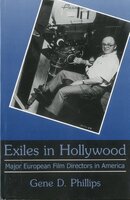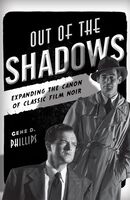Fred Zinnemann
Books by Gene Featuring Fred Zinnemann
Filmography
- Kid Glove Killer (1942)
- Eyes in the Night (1942)
- Little Mister Jim (1946)
- My Brother Talks to Horses (1947)
- The Men (1950)
- Teresa (1951)
- A Hatful of Rain (1957)
Correspondence
Fred Zinnemann maintained a correspondence with Gene Phillips spanning over two decades.
To find Phillips and Zinnemann's letters, here's a guide:
From Phillips' Letters, 1970-2004
Rev. Gene Phillips Letters, 1970-2004
PAGE 2-3: Letter from Fred Zinnemann to Rev. Gene Phillips, Jun. 17, 1971.
Zinnemann states that he looks forward to meeting Phillips with the intent of possibly being included in a book of interviews. Zinnemann suggests July 25th and mentions to hearing about “Father Pat.”
PAGE 6-7: Letter from Fred Zinnemann to Rev. Gene Phillips, Aug. 30, 1971.
Zinnemann continues a conversation he and Phillips had evidently had in-person about a script and/or a biographic work. Zinnemann provides comments and mentions the films The Nun’s Story (1950), From Here to Eternity (1953), High Noon (1952), Man for All Seasons (1966), and The Sundowners (1960).
PAGE 11: Letter from Fred Zinnemann to Rev. Gene Phillips, Aug. 7, 1972.
Typed on “CHACAL” Universal Productions France stationery with signature and minor corrections made in blue ink. Zinnemann describes being “over [his] ears” shooting The Day of the Jackal (1973) and refers Phillips to PR representative Gordon Arnell for more information about production. Zinnemann is still unsure of the film’s quality, requesting Phillips say a “small prayer” for him.
PAGE 20-22: Letter from Fred Zinnemann to Rev. Gene Phillips, Aug. 14, 1975.
Attached via staple. Zinnemann provides Phillips with a list of corrections to the latter’s writing about The Nun’s Story (1959) and some details from their interview, along with some requests for changes, including comments about The Seventh Cross (1944), Odd Man Out (dir. Carol Reed, 1947). And The Day of the Jackal (1973).
PAGE 27-28: Letter from Fred Zinnemann to Rev. Gene Phillips and postscript, Jun. 13, 1978.
Zinnemann comments on Lou Giannetti’s analysis of The Member of the Wedding (1952), stating he did not agree with some of his opinions. He goes on to state that some of the comments he’d made in his interview with Phillips did not come across as intended, and so he rewrote the transcript. Furthermore, Zinnemann requests that Phillips not quote him unless he includes the postscript printed on the back of the letter, along with underline on word “not” and “unless.”
Postscript: Zinnemann explains his function in the film was “rather limited” because he struggled to “get past the Mafia surrounding George Cukor.” He goes on to explain that the two are on friendly terms, but Zinnemann’s contract with Cukor was not renewed as Zinnemann was signed to MGM “shortly after Camille in 1937.” He goes on to state he is “superstitious” about sharing new projects and will “therefore keep things quiet.”
PAGE 29: Letter from Mary Welsh Hemingway to Rev. Gene Phillips, Aug. 20, 1978.
M. Hemingway describes her late husband Ernest’s thoughts on various adaptations of his work. According to Mary, Ernest only liked The Killers (1946), “made by a man, long dead, whose name [she] tried and tried to remember and cannot” (possibly Mark Hellinger, d. 1947, if not Robert Siodmak, d. 1973, as she says the name was Irish, but Edmond O’Brien was still alive at the time.) She recalls Ernest’s complaint about Gary Cooper’s “brand-new shirt from Abercrombie and Fitch” in a rugged scene in For Whom the Bell Tolls (1943). She speaks kindly of Fred Zinnemann, of whom Ernest was fond, and who was originally set to direct The Old Man and the Sea (1958), though she believed Zinnemann (misspelt “Zimmerman”) would not approve of the casting of his friend Spencer Tracey in the lead. M. Hemingway continues, stating that she had no clear memory of Ernest’s specific comments on other films, including the three versions of To Have and Have Not (1944, 1950,1958) and two versions of A Farewell to Arms (1932, 1957). She concludes with a memory of fishing for marlin during filming.
PAGE 30: Letter from Fred Zinnemann to Rev. Gene Phillips, Sept. 8, 1978.
Zinnemann thanks Phillips for the note about Hemingway. He recalls the first days of shooting, and that he did not quit because of Jack Warner “viewing the rushes.” He concludes with the request that “spurious gossip” be removed by “omitting the two sentences which contain my misspelt name” in reference to Mary Welsh Hemingway’s letter.
Note: Zinnemann types his signature with six N’s at the end instead of the usual two.
PAGE 31: Letter from Fred Zinnemann (unsigned) to Rev. Gene Phillips, Jun. 16, 1980.
Zinnemann replies to a series of questions from Phillips. He says that Phillips was “partly right” about what George Cukor told him, stating that his first job in Hollywood, in November 1929, was an extra on All Quiet on the Western Front (1930) before being fired by an Assistant Director. Cukor, he says, had also just arrived in Hollywood from New York. After Zinnemann worked with Busby Berkeley and Gregg Toland, Cukor later hired him in 1936 for Camille (1936) with Greta Garbo and Robert Taylor.
PAGE 46: Letter from Fred Zinnemann to Rev. Gene Phillips, Aug. 17, 1987.
Zinnemann greets Gene and requests he let Zinnemann know when the updated Movie Makers will be published. He goes on to list “a number of very talented men deserving of your attention” that were not included among British Directors. He names Michael Radford (specifying Another Time, Another Place [1983] and 1984 [1984]), Mike Newell (Dance With a Stranger [1985]), Neil Jordan (Mona Lisa [1986]), Jack Gold, Lindsay Anderson, Alan Bridges, Bruce Beresford, and Jack Clayton. Zinnemann identifies Gold and Redford as the strongest talents in his opinion and suggests the inclusion of Alan Parker.
PAGE 47: Letter from Fred Zinnemann to Rev. Gene Phillips, May 23, 1988.
Zinnemann thanks Phillips for the program note and recording of music for The Wave (Redes, 1936). Zinnemann says he was not “particularly upset” by the description identifying The Wave as “Paul Strand’s film,” though he clarifies that he found Strand to be a “great photographer… also a great egomaniac.” He also asks for Phillips’ thoughts on the ending of Five Days One Summer (1982), which he states was based on the short story “Maiden Maiden” by Kay Boyle.
PAGE 48: Letter from Fred Zinnemann to Rev. Gene Phillips, Jun. 30, 1988.
Zinnemann begins stating that he would be “delighted” to be a dedicatee in Phillips’ latest book and sharing the honor with George Cukor. He also refers to two articles from American Film magazine both titled “Dialogue on Film:” one by Carl Foreman (Apr. 1979) and the other by Stanley Kramer (Apr. or May 1973). He then says Phillips is perhaps aware of “the entire affair” about High Noon (1952) that it is “probably too late to do much about it anyway” and Zinnemann “just thought [he] would mention it.” He concludes saying he was “fascinated” by the clip from the New York Times Book Review, says he is sorry to hear about Mankiewicz, and “did not expect anything different from Sam Spiegel.”
PAGE 52: Letter from Fred Zinnemann to Rev. Gene Phillips, Jun. 20, 1994.
Zinnemann notes that he is glad to hear from Phillips “after all these years” and learn that Phillips is working on a new book. Zinnemann then describes how directors are trying to establish “Moral Rights of authorship” for their work in film, to “protect it from mutilation.” He goes on to describe struggles with opposition from the industry and “apathy” from the public due to the lack of media coverage of the issue. Zinnemann asks Phillips to help them further public awareness of this issue, as there is a threat of “destruction” to their “cultural heritage” of cinema in Europe and the United States. “Can you help?” underlined.
PAGE 53: Letter from Fred Zinnemann to Rev. Gene Phillips, Aug. 3, 1995.
Zinnemann addresses Phillips’ intent to include him in his new book project, approving. He then addresses how he and another man (William Wyler?) have different memories of the same incident. Zinnemann says he will not argue about Dodsworth (1936), but that there may be a mistake, naming These Three (1936). Zinnemann ultimately states that his point is that Wyler spoke to him, “in a human way,” and that Zinnemann found it “astonishing and memorable” that Wyler would be so civil in his reaction to a “wildly improbable situation,” and refers to their use of the “same dialogue.” “Me” underlined to emphasize that it was Wyler who spoke to HIM.
PAGE 54: Letter from Fred Zinnemann to Rev. Gene Phillips, Aug. 18, 1995.
Zinnemann comments on an imaginary review of Man’s Fate (1969, abandoned film adaptation of André Malraux’s novel of the same name with Zinnemann set to direct). Regarding The Member of the. Wedding (misprinted as A Member of the Wedding) (1952), he states that he was unaware of 20 minutes being cut from the film but admits he may not remember well if anything of importance was omitted. He also mentions Brandon de Wilde, how he died young. He also corrects a point made by a biographer of Montgomery Clift, stating that Zinnemann’s first film was Redes (1936) and Clift’s was Red River (1948), released after The Search (1948). He also remarks on Hitchcock’s “The Crystal Trench” (Alfred Hitchcock Presents, season 5, episode 2, 1959) and compares jokingly to Five Days One Summer (1982).
PAGE 55: Letter from Fred Zinnemann to Rev. Gene Phillips, Oct. 24, 1995.
Zinnemann thanks Phillips for sending him the new book, adding that he nearly adapted two films of Joseph Conrad, Lord Jim and Heart of Darkness, but “those other boys beat me to it.” Comments on difficulty writing by hand, as it is getting “a bit shaky.” Included exclamation point after “Happy Thanksgiving.”
PAGE 56: Letter from Fred Zinnemann to Rev. Gene Phillips, Jan. 22, 1996.
Full letter transcription:
“Dear Gene,
Many thanks for your letter. In reply to your question and to the best of my memory: I attained American citizenship in March, 1937 at the Federal District Court in Los Angeles.
I look forward with anticipation to the time when your book has been published.
Kind regards,
FRED ZINNEMANN.”
PAGE 57: Letter from Fred Zinnemann to Rev. Gene Phillips, Feb. 9, 1996.
Zinnemann thanks Phillips for sending him a photocopy regarding A Man for All Seasons (1966), stating that he is “of course unable to arrive at an opinion of [his] own.” Zinnemann then mentions that a “youngish” film historian, Adrian Turner, visited him about a biography about Robert Bolt, and asked about A Man for All Seasons. Zinnemann apologizes for not getting approval from Phillips about a chapter but sent it to Turner since it was already published.

